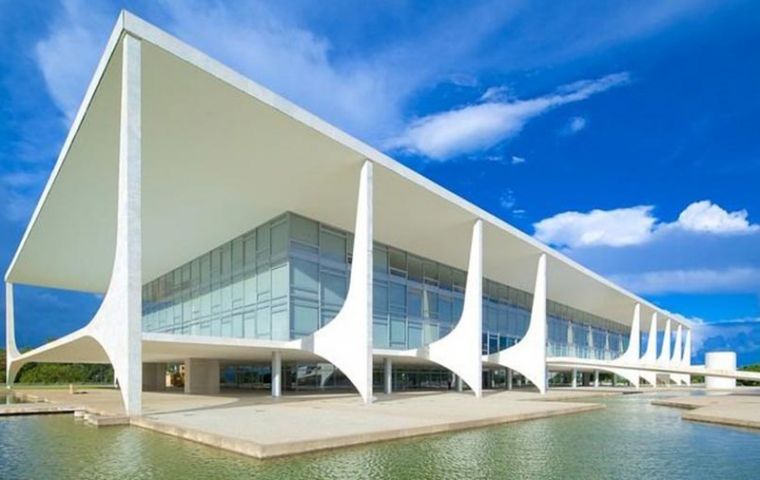MercoPress. South Atlantic News Agency
Brazilian parties begin round of conventions to turn presidential hopefuls in candidates
 In this coming election, the Planalto presidential palace, currently occupied by Michel Temer, is not exerting any influence on the process.
In this coming election, the Planalto presidential palace, currently occupied by Michel Temer, is not exerting any influence on the process. While Brazil’s definitive constellation of political coalitions remains uncertain, political parties start holding their national conventions this Friday (July 20), to name their presidential candidates for the October elections.
The names to run for president and vice-president must be approved in the conventions by August 5 and registered with the Superior Electoral Court by August 15.
As it stands today, 18 people have informally announced their candidacy to the media, down from over 20 in recent months. Some gave up along the way, others were barred from running by political parties. The total number of hopefuls may be lower still, as some parties—like the Democrats (DEM), Solidarity (SD), and the Communist Party of Brazil (PCdoB)—are being pressed to refrain from naming a candidate of their own and instead support more competitive tickets.
The still unclear landscape, political scientist Leonardo Barreto argues, stems from a number of different reasons, not least of which the fact that the Planalto presidential palace is not exerting any influence on the process.
“When the Executive is solid, seeking re-election or attempting to name a successor, we tend to expect the government’s coalition to be reproduced, the opposition to organize itself, and even a third option to arise. This year, however, the government has no strong candidate, nor has there been significant support for someone in the opposition. This led to a high number of candidacies,” he pointed out.
In this scenario, Barreto said, no name has stood out as favorite, which makes it difficult for political parties to take a stance, as they all seek to back someone with real chances of winning. Furthermore, the parties are interested in having a clear plan of government in case they win the electoral race.
Barreto argues conventions are really aimed at starting the negotiations for future alliances and favor larger parties, since they have “more means for exchange”, that is television campaign time, as well as funding, and a complete list of seats for federal and state representatives, and mayors, crucial to the outcome of the general elections.




Top Comments
Disclaimer & comment rules-

-

-

Read all commentsFirst, they allow the crooks to be the candidates. Then the masses have to pay through their noses to publicize their campaigns. On grabbing power, these crooks steal the public funds. The BEST part is that they are so well protected by the LAW, that in spite of being condemned, they enjoy total freedom and above all; need not even return a single stolen dime!! RESULT:
Jul 20th, 2018 - 12:55 pm 0https://www.otempo.com.br/image/contentid/policy:1.2002749:1532041641/CHARGE%20O%20TEMPO.JPG?f=3x2&w=620&$p$f$w=ac4ac92
Fairly reasonable summary of events...those who expect any positive changes, might be in for a shock...
Jul 25th, 2018 - 08:05 pm 0The SUM of “it” ALL:
Jul 28th, 2018 - 11:59 am 0https://i1.wp.com/www.humorpolitico.com.br/wp-content/uploads/2013/09/Safadinho-por-Boopo.jpg?resize=420%2C420&ssl=1
Commenting for this story is now closed.
If you have a Facebook account, become a fan and comment on our Facebook Page!